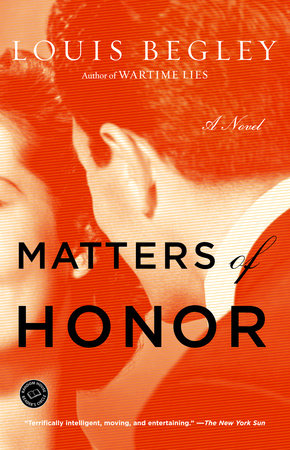Matters of Honor Reader’s Guide
By Louis Begley


1. Harvard College in the 1950s is a vivid setting for the first part of Matters of Honor. Could this novel have taken place at another institution, or does Harvard have a unique significance?
2. Henry says: “Margot and Margot’s parents are way up at the top of the tree. We’re way down here at the roots. But that’s the one tree I will learn to climb. Otherwise there is no point in my being here” (p. 51). How would you describe the social hierarchy portrayed in this novel? What do you think Henry means by “here”? Harvard? America? Or something else?
3. Archie’s ambitions seem to reflect the values not of his own parents, but of Sam’s. He aspires to their 100 percent respectability. That status being unattainable to him, he settles for the trappings of high society, and the reckless, irresponsible behavior that tends to follow them. Why, then, do you think Sam is drawn to Archie as a friend? What makes Archie different from the Standishes?
4. Before matriculating at Harvard, Sam learns that he had been adopted. What is Sam’s reaction to this startling revelation? Both his physical appearance and the secret trust fund paying for his education suggest that he might still have blood ties to the Standish family. Why do you think Begley included these details?
5. On a weekend vacation at the Standish household, George forces himself on Margot while she is sleeping. How does she handle the situation? Does he take responsibility for his actions and feel that he has done something wrong? If this incident had taken place today instead of back in the 1950s do you think Margot might have responded differently?
6. Sam’s romantic life is not spelled out in the novel, but it is implied that he is a homosexual. Why do you think he is so guarded about his sexuality? Why do think that Begley chose not to explore these undertones further? Are there any similarities between Sam’s relationship with sex and Henry’s relationship with Judaism?
7. Sam develops a long-standing dependancy on psychoanalysis, stemming from his “nervous breakdown” at Harvard. Why is he so drawn to this kind of therapy? How, if at all, do you think it helps him?
8. At the beginning of the novel, the trio of roommates share an important relationship. How do things change after Archie’s death? What do you think is Archie’s role in the novel? How was Archie important to the development of Sam and Henry’s relationship?
9. At the beginning of the novel, Henry says: “I feel no more Jewish than a smoked ham” (p. 31). And at the end he says, “You might rightly ask what my self-negation got me. My Jewism is still with me, like bad breath . . . I have gotten nothing, zero, or less than zero” (p. 291). What part do you think Henry’s unease with his past and identity played in the destructive relationship between him and Hubert de Sainte-Terre? Do you think Henry could have shaped his life differently once he had arrived at Harvard?
10. Henry’s lifelong infatuation with Margot is one of his most defining characteristics. Even after she marries, Henry finds himself unable to move on. “I can’t tell any of those ladies, even the ones I like most and respect, that I love her more than anything else on earth and want to marry her. Not with Margot in the rue Barbet de Jouy” (256). Why do you think Henry is so drawn to Margot? Why is she drawn to him? Why does their relationship consistently fail?
11. Near the end of the novel, Margot blames Sam for Henry’s unhappiness, saying: “You and Archie taught him all those tricks. Like a bear in the circus. Why didn’t you all leave him alone? Why did you help him become an honorary Aryan?” (301) Do you agree with her? Would Henry have been better off without Sam? Without Margot?
12. Names are significant in Matters of Honor, often representing the personal struggles that the characters face. Sam’s surname, for example, ties him to a family about whom he feels ambivalent. Archie’s name has a deceptively aristocratic ring to it. And Henry’s name has the ability to adapt in whatever way he chooses. At the end of the novel, he tells Sam that “Leblanc is no more my name than White, but everyone here knows that I wasn’t born Leblanc and no one cares. Although my French is easily as good as my English, people realize that I’m a foreigner. That defines me. There’s nothing to explain; no one to betray” (306). As the novel concludes, how do you think each character has lived up to or forsaken his name? What does the future hold for the next generation of characters–Margot’s Henry and Henry’s Sam?
Just for joining you’ll get personalized recommendations on your dashboard daily and features only for members.
Find Out More Join Now Sign In